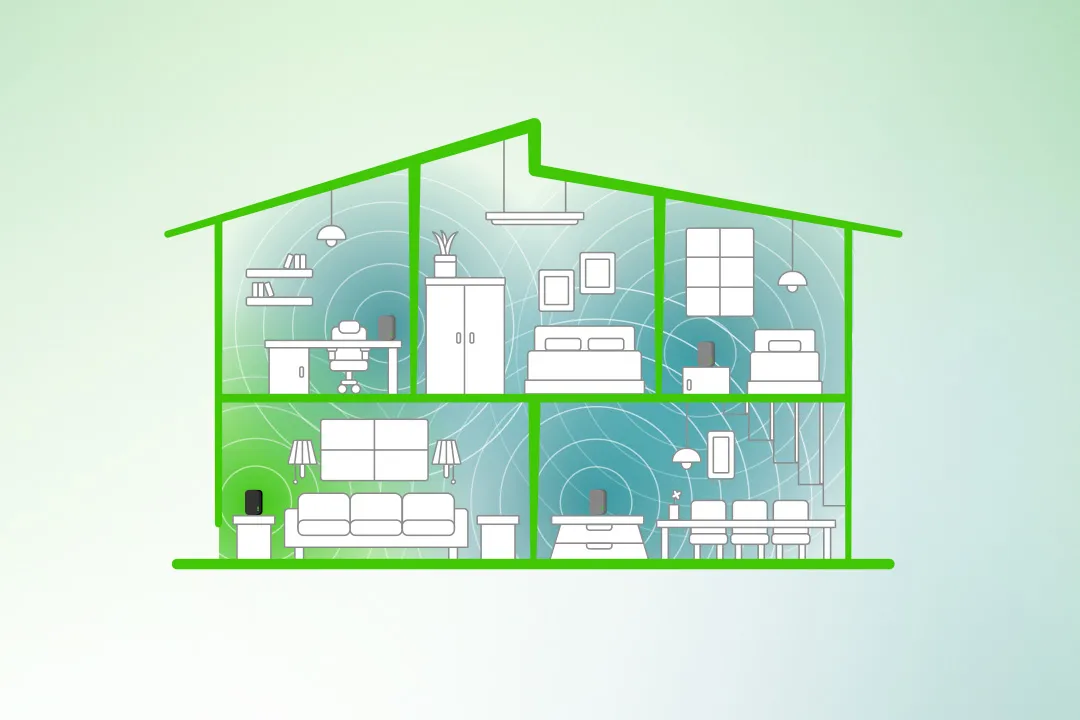Mesh WiFi vs WiFi Extenders: Which Signal Booster is Better for Your Home?

If you’ve ever struggled with WiFi dead zones in your home, it’s likely you’ve heard of these two solutions:WiFi extenders (otherwise known as signal boosters) and mesh WiFi systems.
But which one will solve your WiFi issues?
In this guide, we’ll break down the differences between mesh WiFi and WiFi extenders, explain how they work, and help you figure out which option is best for your home, based on your layout, internet habits, and devices.
What Are WiFi Extenders?
WiFi extenders are also known as repeaters or signal boosters. They are plug-in devices that rebroadcast your router’s wireless signal to areas where your router’s signal can’t reach. The idea is simple: place the extender somewhere between your main router and the weak spot, and it acts as a bridge to stretch the coverage.
| Key benefits | Limitations |
|---|---|
| Budget-friendly: These devices are generally quite affordable, making them ideal for quick fixes. | Reduced speeds: Many extenders use the same frequency to communicate with both the router and your device, which can lead to a 50% drop in speed. |
| Easy to install: Most extenders plug directly into a power socket and require minimal setup via a browser or app. | Separate network name: Some models create a second SSID, requiring you to manually switch networks as you move around the house. |
| Good for small spaces: They work best in apartments or small single-storey homes where the distance between the router and dead zone isn’t too far. | Limited range and scalability: Not ideal for homes with thick walls, odd layouts, or multiple floors. Adding more extenders doesn’t always guarantee better performance. |
What Is Mesh WiFi?
Unlike extenders, mesh WiFi systems use multiple interconnected nodes (or “points”) placed throughout your home to create one large, unified wireless network. Each node communicates with the others, ensuring seamless signal transitions and even coverage everywhere.
Think of it as a team effort: instead of your router doing all the heavy lifting, every node works together to ensure your internet connection is strong wherever you are — from the upstairs bedroom to the kitchen, and even out on the balcony.
Mesh systems are especially useful in larger homes or smart homes, where multiple devices need a strong and stable connection at the same time.
Mesh WiFi vs WiFi Extenders: Key Differences at a Glance
Here's a quick comparison to help you see how mesh network vs extenders stack up across different areas:
| Category | WiFi Extenders (Signal Boosters) | Mesh WiFi Systems |
|---|---|---|
| Setup | Very simple: plug into a socket and connect. | Guided app setup with more control. |
| Cost | Budget-friendly, ideal for quick fixes. | Higher upfront cost, but long-term investment. |
| Coverage | Works best in small homes or single rooms. | Strong, seamless coverage across large or multi-storey homes. |
| Speed Performance | May reduce speed since it rebroadcasts the same signal. | More consistent speeds with node-to-node communication. |
| Scalability | Limited — adding more extenders doesn’t always improve coverage. | Highly scalable — add more nodes as your needs grow. |
| Device Handling | Suitable for a few connected devices. | Handles multiple devices smoothly, great for smart homes. |
| Network Name (SSID) | May create a second network name; requires manual switching. | Single network name across all nodes, automatic connection. |
Mesh WiFi vs WiFi Extender, Which One Is Right for You?
So, when it comes to mesh WiFi vs WiFi extender, how do you choose?
Let’s break it down by a few key factors:
Home size and layout
If you live in an apartment, studio, or single-storey terrace, a simple signal booster might be enough. On the flip side, a mesh system might be the better option for wider and more reliable coverage if you are staying in a multi-storey house or long-layout home.
Number of connected devices
If you only have a few devices connected at a time (say, a laptop, phone, and TV), an extender can manage fine. However, if you have more devices, a mesh network is much more efficient.
To find out more about how the number of devices can affect your internet, you can read our article “How Many Devices Can Your Fibre Connection Handle? A Practical Guide”.
Your internet plan
Lower-speed plans may not benefit fully from a mesh system’s capabilities, whereas a higher-speed internet plan helps to unlock the full potential of mesh WiFi.
Your comfort with tech
Prefer something quick and simple? Extenders are often just plug, connect, and go. But if you’re comfortable using apps and managing your own devices, then a mesh system gives you more control and better results.
Maximise Your Home WiFi Coverage with the Right Solution
Both mesh WiFi and WiFi extenders can improve your home internet experience — but the best choice depends on your home layout, usage habits, and performance expectations.
If you want a quick fix for a small dead zone, a WiFi extender or signal booster might do the trick. But if you’re looking for a faster, seamless, reliable, and future-ready network across your entire home, mesh WiFi is the smarter choice.
Talk to Maxis today about upgrading your home setup and enjoy strong, stable internet in every corner of your home.